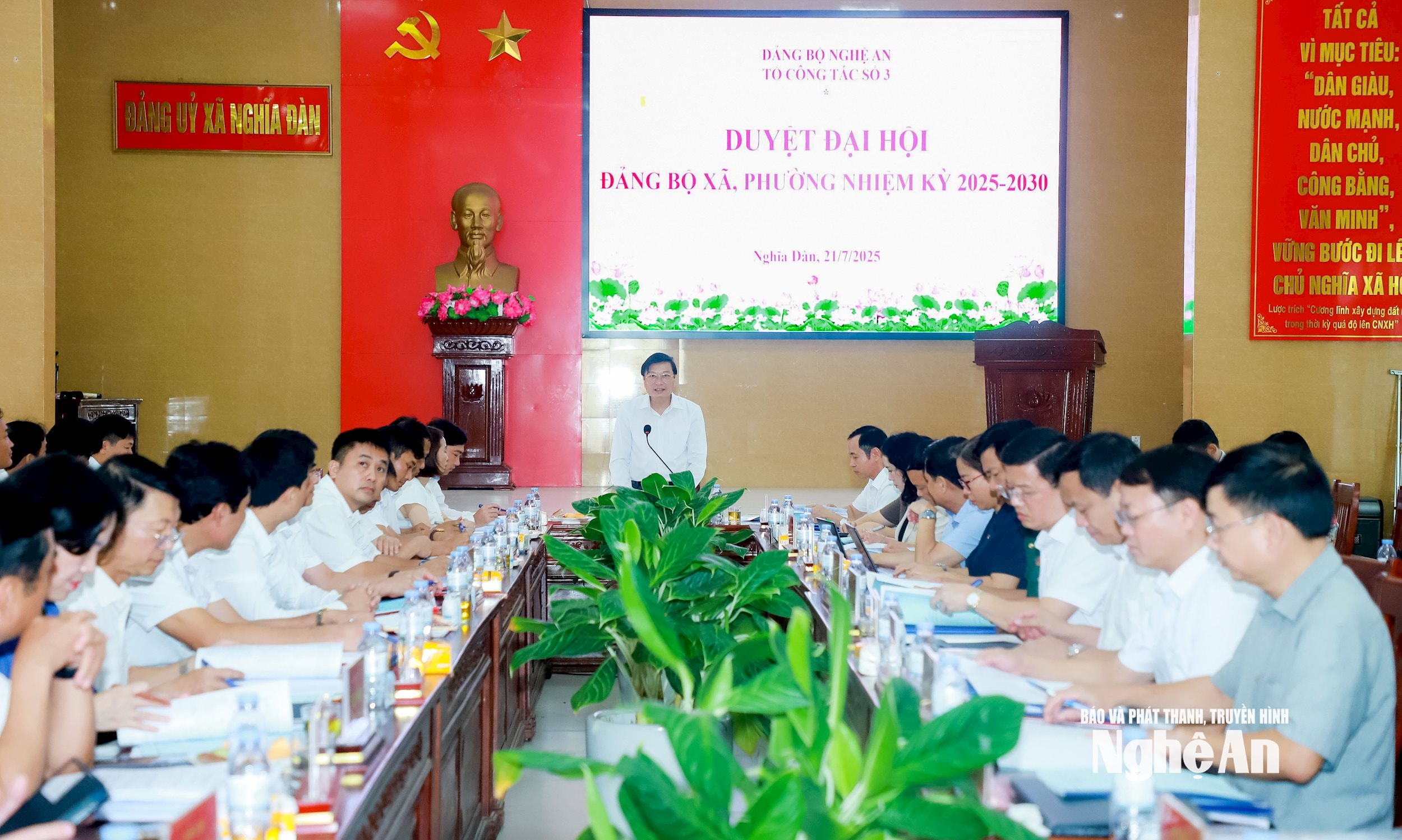Chairman of Provincial People's Committee Le Hong Vinh presides over the approval meeting for the Party congresses of Nghia Hung, Nghia Lam, and Nghia Mai communes
On the afternoon of July 21, at the headquarters of the Nghia Dan Commune Party Committee, Mr. Le Hong Vinh - Deputy Secretary of the Provincial Party Committee, Chairman of the Provincial People's Committee, and Head of Working Group No. 3, presided over the approval meeting for the Party congresses of Nghia Hung, Nghia Lam, and Nghia Mai communes.

Focusing on agricultural development, building advanced new-style rural areas
Nghia Hung commune was established by merging the former Nghia Hung and Nghia Thanh communes (of the former Nghia Dan district), with a natural area of 68.65km² and a population of 25,459 people. The commune's Party organization has 52 cells with 1,281 Party members.
With the motto: "Solidarity - Democracy - Discipline - Innovation - Creation - Entering a new era", the draft political report of the Nghia Hung Commune Party Committee sets the goal of soon achieving the status of an advanced new-style rural area.
To achieve this goal, the draft political report outlines 5 viewpoints, sets 26 main targets, 5 key tasks, 3 breakthrough stages, and 4 main solutions.
Meanwhile, Nghia Lam commune was formed by merging the communes of Nghia Lam, Nghia Son, Nghia Yen, and Nghia Lac (of the former Nghia Dan district), with an area of 121.75 km²; a population of 5,334 households with 23,753 people. The Nghia Lam commune Party organization has 46 subordinate Party organizations and cells with a total of 1,183 Party members.
With the spirit of: "Solidarity - Democracy - Creativity - Development", the draft political report of the Nghia Lam Commune Party Committee aims for the commune to become sustainably developed and meet the criteria for an advanced new-style rural area by 2030.
Based on this, the Nghia Lam Commune Party Committee has formulated 5 development viewpoints, 24 targets, 4 main tasks and solutions, and 3 development breakthroughs.
Nghia Mai commune was established by merging 3 communes: Nghia Minh, Nghia Hong, and Nghia Mai (of the former Nghia Dan district), with a natural area of 146.99km², comprising 23 hamlets and villages with a population of 17,844 people. The commune's Party organization has 40 subordinate cells and Party organizations with 922 Party members.
With the motto: "Solidarity - Democracy - Discipline - Creativity - Innovation - Development", the draft political report of the Nghia Mai Commune Party Committee sets 27 main targets, 2 groups of key tasks and solutions, and 3 breakthroughs; striving to become a new bright spot in the agricultural sector on Nghe An province's map by the end of the 2025-2030 term.
At the meeting, members of the working group and representatives from various departments and sectors contributed many important opinions on the development direction of the communes, focusing on the fields of culture, society, health, agriculture, the implementation of national target programs, the application and development of science and technology, and the promotion of private economic development.
"Straight ranks, clear paths, united in progress"
Concluding the meeting, Mr. Le Hong Vinh - Deputy Secretary of the Provincial Party Committee, Chairman of the Provincial People's Committee, and Head of Working Group No. 3, assessed that despite the very short preparation time and development orientation challenges, as the new communes were formed by merging old ones. The data and the direction determined in the draft political reports required high concentration. Furthermore, while the mergers help expand the territory and create conditions for pooling potential and advantages for development, they also pose significant organizational and operational challenges.
In that context, the Chairman of the Provincial People's Committee acknowledged that the communes have seriously and fully implemented the requirements, basically meeting the demands of Directive No. 45-CT/TW dated April 14, 2025, of the Politburo, and Communiqué No. 13-TT/TU dated April 26, 2025, of the Provincial Party Standing Committee on Party congresses at all levels, as well as the guidance from the advisory and assistance bodies of the Provincial Party Committee. The draft documents of the communes have generally followed the orientation and met the set requirements.
Regarding viewpoints, tasks, and solutions, the Chairman of the Provincial People's Committee requested that the communes continue to adhere to the regional planning and orientation of the former Nghia Dan district, especially the plans for land, infrastructure, and construction with a development vision to 2045. Based on this, each locality must effectively exploit its potential and advantages in infrastructure, land, and human resources, while also linking together to form a synchronized development whole.
Going into the specific content of the draft political reports, Mr. Le Hong Vinh pointed out some limitations, such as: solutions for mobilizing local resources are still fragmented; the orientation for cadre training and the planning and linkage between communes are not yet clear.
Adhering to the direction of General Secretary To Lam at the 12th Conference of the 13th Party Central Committee, the entire Party, people, and army are to shift from a state of "running while lining up" to "straight ranks, clear paths, united in progress" towards the future.
In that context, Mr. Le Hong Vinh emphasized several points for the localities to proceed methodically and uniformly towards long-term development goals; from viewpoints, objectives, tasks, and solutions, especially the breakthrough stages which need to be focused and centered on the localities' strengths.
During this process, he requested that relevant departments and sectors support and accompany the communes in determining targets, including in the areas of security and defense.
The Chairman of the Provincial People's Committee requested that the units, based on the contents of the meeting, review their own documents to supplement and amend them accordingly; prepare thoroughly for the organization and conditions of the congresses; carry out effective publication about the congresses, and pay attention to the ideological situation of cadres, Party members, and the people before, during, and after the congresses; and also assigned the sectors to monitor and guide the Party committees to prepare and organize the Congresses well, and to advise on timely handling of any arising issues.
